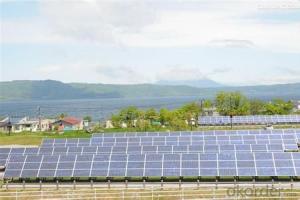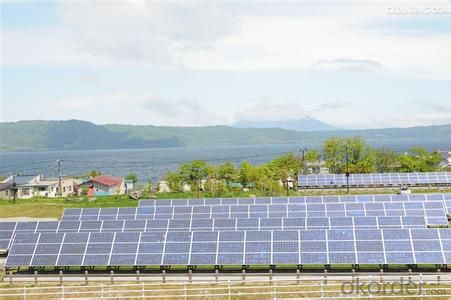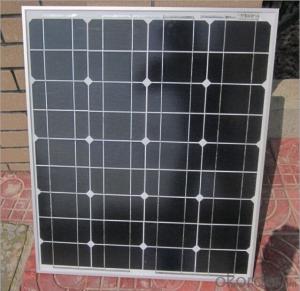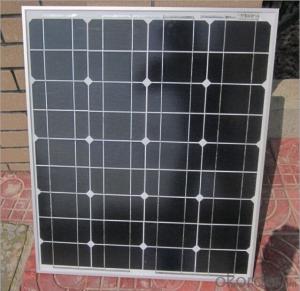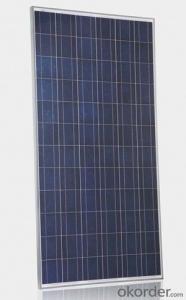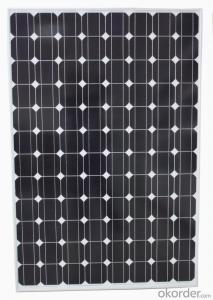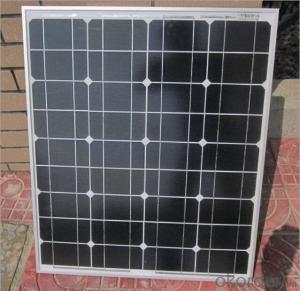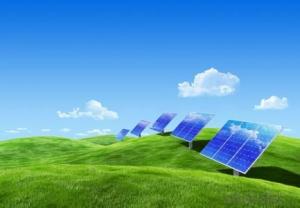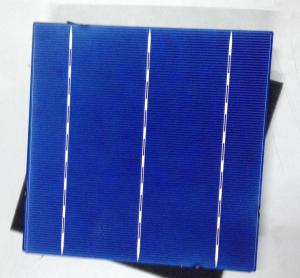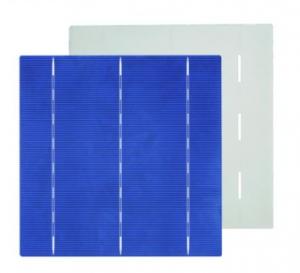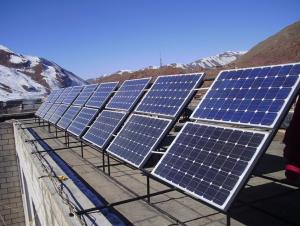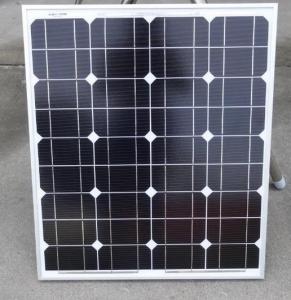Discount Monocrystalline Silicon Home Solar Cells 50w
- Loading Port:
- China Main Port
- Payment Terms:
- TT OR LC
- Min Order Qty:
- -
- Supply Capability:
- -
OKorder Service Pledge
Quality Product, Order Online Tracking, Timely Delivery
OKorder Financial Service
Credit Rating, Credit Services, Credit Purchasing
You Might Also Like
Quick Details
| Model Number: | |||||
| Material: | Size: | Number of Cells: | |||
| Max. Power: | Certificate: | Color: | |||
| Frame: |
Packaging & Delivery
| Packaging Detail: | packaging:carton and wooden pallets. weight:4.3kg 20GP:2065pcs 40HQ:4310pcs |
| Delivery Detail: | 15-20 days ,depend on your order quantity. |
Specifications
1.17% conversion efficiency.
2.Excellent quality with good price.
3.100% TEST before and after encapsulation.
4.MOQ:100pcs
Design features of solar panel:
Front | Tempered glass |
Encapsulation | EVA |
Back | TPT |
Frame | Aluminum |
Warranty | 5 years |
Life time | 25 years |
Certificate | CE, ISO, ROHS |
Electrical characteristics:
| Maximum Power[Pmax] | 50W ±5% |
| Maximum Power Voltage[Vmp] | 18V ±3% |
| Maximum Power Current[Imp] | 2.77A ±3% |
| Short-Circuit Current[Isc] | 3.05A ±3% |
| Open-Circuit Voltage[Voc] | 21.6V ±3% |
| Current Temperature coefficient | 0.08%/ ℃ |
| Voltage Temperature Coefficient | -0.32%/ ℃ |
| Power Temperature Coefficient | -0.38%/ ℃ |
| Maximum System Voltage | 1000V |
- Q: Can solar cells be used in sports stadiums?
- Yes, solar cells can be used in sports stadiums. They can be installed on the roofs or facades of stadiums to generate renewable energy, reducing the reliance on traditional sources of electricity. This can help lower operating costs and reduce a stadium's carbon footprint. Additionally, solar cells can provide shade in outdoor stadiums, enhancing the spectator experience.
- Q: What is the role of power optimizers in solar cell systems?
- The role of power optimizers in solar cell systems is to maximize the energy output of each individual solar panel by ensuring that it operates at its maximum power point (MPP). Power optimizers achieve this by mitigating the effects of shading, module mismatch, and other factors that can decrease the overall performance of the system. They also enable panel-level monitoring and provide important data on the performance of each individual panel, allowing for more efficient maintenance and troubleshooting.
- Q: How do solar cells impact energy security?
- Solar cells have a positive impact on energy security as they provide a reliable and sustainable source of electricity. By harnessing the power of the sun, solar cells reduce dependence on finite fossil fuels, increasing energy independence and reducing the risks associated with fluctuating fuel prices and geopolitical conflicts. Additionally, solar energy can be generated locally, reducing the vulnerability of energy supply chains and enhancing resilience in the face of natural disasters or other disruptions. Overall, solar cells play a crucial role in diversifying the energy mix and enhancing energy security for individuals, communities, and nations.
- Q: Can solar cells be used for powering data centers?
- Yes, solar cells can be used for powering data centers. Solar energy can be harnessed through photovoltaic cells and converted into electricity, which can then be used to power data centers. This renewable energy source is increasingly being adopted by data centers to reduce their carbon footprint and energy costs.
- Q: How do solar cells impact carbon emissions?
- Solar cells have a significant positive impact on carbon emissions as they generate electricity without burning fossil fuels, thus reducing reliance on carbon-intensive energy sources. By harnessing the sun's energy, solar cells help minimize greenhouse gas emissions, combatting climate change and promoting a cleaner and more sustainable energy future.
- Q: What is the role of monitoring systems in solar cell systems?
- The role of monitoring systems in solar cell systems is to track and analyze the performance of the solar panels, inverters, and other components. These systems provide real-time data on the energy production, efficiency, and potential issues or malfunctions. This allows for proactive maintenance, troubleshooting, and optimization of the solar cell system, ensuring maximum energy output and overall system reliability.
- Q: Can solar cells be used for powering irrigation systems?
- Yes, solar cells can be used for powering irrigation systems. Solar energy can be converted into electricity by solar cells, which can then be used to power irrigation pumps and other necessary equipment. This offers a sustainable and environmentally friendly solution for providing power to irrigation systems in remote or off-grid areas.
- Q: Can solar cells be used in recreational vehicles (RVs)?
- Yes, solar cells can be used in recreational vehicles (RVs). Solar panels can be installed on the roof of an RV to generate electricity from sunlight, which can then be used to power various appliances and systems in the vehicle. This provides a sustainable and eco-friendly way to generate power while on the road.
- Q: Can solar cells be used in telecommunications systems?
- Yes, solar cells can be used in telecommunications systems. Solar cells can generate electricity from sunlight, which can be used to power various components of telecommunications systems such as base stations, repeaters, and communication towers. This reduces reliance on traditional power sources and provides a more sustainable and cost-effective solution. Additionally, solar cells can be easily installed in remote locations where grid power is not available, making them an ideal choice for extending communication networks in rural or off-grid areas.
- Q: How's the feedback of using 260 watt photovoltaic solar panel? Anybody ever used that?
- the 260 watt photovoltaic solar panel is widely used in the solar cell power supply plant, and my personal feedback is very positive.
Send your message to us
Discount Monocrystalline Silicon Home Solar Cells 50w
- Loading Port:
- China Main Port
- Payment Terms:
- TT OR LC
- Min Order Qty:
- -
- Supply Capability:
- -
OKorder Service Pledge
Quality Product, Order Online Tracking, Timely Delivery
OKorder Financial Service
Credit Rating, Credit Services, Credit Purchasing
Similar products
Hot products
Hot Searches
Related keywords
